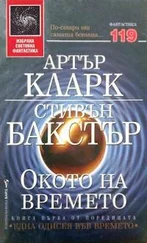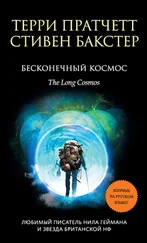1 ...6 7 8 10 11 12 ...108 On the other hand, by the laws of statistics, there ought to be a billion Einsteins out there. Nobody knew what they were all doing. They sure weren't working together.
All those pious dreams of the space buffs of some kind of giant solar-system civilization had never been remotely likely. There were just too many people. The human race had gathered into a billion small-town-sized tribes and splintered, shaping and seeking goals unimaginable to an Earth-born geezer like him.
It seemed to him, in fact, that he was watching the end of the species, as a unitary whole: two million years out of Africa, the race had escaped from the cradle and was growing, to where the hell nobody could even guess.
… And now here came Toutatis on its aerobraking pass.
The rock looked like a comet glowing in the thin upper air of Earth, streaking by in a perfect straight line below Greenberg. It made the cities and oceans of Earth glow like the day - it must have been a remarkable sight from down there - and asteroid light played on his own face, the ancient bones of his eye sockets.
The encounter was over in seconds. The trail of scorched air soon dissipated and dimmed, and Toutatis, its orbit subtly altered, passed on towards its next encounter. It was going to take fifty years to nudge Toutatis into its final low Earth orbit, but planning projects on that kind of time scale didn't seem to trouble the inhabitants of Toutatis, or anybody else.
The show was over. The people of Ra-Shalom drifted away from their blue watery windows, and returned to their mysterious business within.
Greenberg had never meant to live for a thousand years. It was ridiculous. Nobody else had stuck around like this. It was just
that he would have had to have chosen when to die, and that was something he had never expected to face when he grew up, and he just had no instinct for it.
Anyhow, if he let himself die, he would have missed this.
Greenberg, with a sigh, turned away from the window and went to his instrument consoles.
It was a massive asteroid, big enough to have dragged itself into a sphere, with planet-like layers of internal structure, rich in metals, rocks and volatiles. It was bathed by the light of a sun only three times as far away as from Earth.
The guardians considered carefully. It was, after all, to be the repository of all that was left of their designers' species, until even this new young sun guttered and died.
They were machines designed to plan for billions of years. They had already nursed their fragile cargo across such deserts of time. Now, looking to the future, they must plan for evolution, even the loss of mind.
It was a good home, rich in energy and resources.
The guardians were satisfied. They closed themselves down.
Within the rock, history continued.
Scale: Exp 4
It was to be quite a day, as the last of Ra's ore was transmuted, and Greenberg made sure the Weissmans woke him up to see it. In the event he nearly missed it, it took so long to put him together again.
Greenberg's window was the same old tunnel through fused regolith, but the view beyond changed as he watched, the last of the grey-black old crap literally dissolving before his eyes, to be replaced by a sharp, tight blue curve of watery horizon.
Too damn sharp, he thought. He wondered if those asshole nanobugs had changed his eyes on him again while he'd slept. But even his naps lasted a century at a time, longer than he had once expected to live; they had time.
Anyhow, his new eyes showed him a blue world, the landscape softly pulsing, with Greenberg's NASA-style space station hab module stuck stubbornly to the side under its crust of regolith, like a leech clinging to flesh. Ra was just water now, encased by some smart membrane that held the whole thing in place and collected solar energy and regulated temperature and stuff. It
looked like a little clone of Earth, in fact, and Greenberg thought it was somehow appropriate that today that tired, depopulated old Earth itself was over somewhere the far side of the sun, invisible, forgotten, the last traces of man being scraped off by the returned glaciers.
Under the pulsing surface of Ra he could make out dark brown shapes, graceful and lithe: people, Weissmans, whole schools of them flipping around the interior. And now here came a child, wriggling up to the membrane, pushing its disturbingly human face up to the wall, peering out - with curiosity or indifference, he couldn't tell which - at the stars. It broke his unreconstructed twentieth-century heart to see that little girl's face stuck on the end of such a fat, unnatural body.
An adult came by and chivvied the kid away, into the deeper interior; Greenberg saw their sleek shapes disappear into the misty blue.
The Weissmans had been working on making their environment as simple and durable as they could. They were planning for the long haul, it seemed. So, the whole rock had been transformed into this spherical ocean, and the biosphere had been cut down to essentially two components: Weissmans, post-humans, swimming around in a population of something that was descended from blue-green algae. The algae, feeding on sunlight, were full of proteins, vitamins and essential amino acids. And the humans ate the algae, drank the water, breathing in oxygen, breathing out carbon dioxide to feed the algae.
When people died their bodies were allowed to drift down to the centre of the world, where supercritical water reactors worked to break down their residues and return their body masses to the ecosystem.
The loops were as closed as they could be. The loss that entropy dictated was made up by the energy steadily gathered by that smart membrane, and a few nanobugs embedded there. Greenberg understood that research was going on to eliminate the last few technological components of the system: maybe those supercritical water reactors could be replaced by something organic, and maybe even the surface membrane and the last nanobugs could be done away with. For instance, a few metres of water would serve as a radiation shield.
It was a kind of extreme end result, Greenberg supposed, of the technology evolution that had begun all the way back with John
Glenn in his cramped little Mercury tin can, breathing in canned air for his few orbits of the home planet.
But the Weissmans were not much like John Glenn.
He didn't know any of their names. He didn't care to. For a long time now, longer than he cared to think, there had been hardly anybody alive who remembered him from one waking period to the next, from one of his 'days' to another. Hell of a thing. He preferred to talk to the machines, in fact.
Greenberg didn't even know if the Weissmans were still human any more.
The last of the true humans, as he recognized them, had been leaving the system for millennia.
It had been necessary. For a time, as the human population grew exponentially, it looked as if even the solar system's vast resources were in danger of depletion.
So somebody had to leave, to open up the loops once more.
There was a whole variety of ways to go, all of them based on pushing people-laden rocks out of the system. You could mount a big mass driver on the back of your rock and use its substance as reaction mass. Close to the sun, you could use its heat to just boil off volatiles. You could use a solar sail. You could use Jupiter's powerful electromagnetic field as a greater mass driver. And so on. There was even a rumour of an anti-matter factory, out in the Kuiper Belt somewhere.
Greenberg's favourite method was the most resolutely low-tech. Just nudge your rock out of its stable orbit, let it whip through the gravity fields of Jupiter and Saturn a few times, and you could slingshot your way out of the system for free. Of course it might take you ten thousand years to reach your destination, at Barnard's Star or E Eradini or E Indi. But what the hell; you probably had with you more water than in the whole of the Atlantic Ocean.
Читать дальше
Конец ознакомительного отрывка
Купить книгу
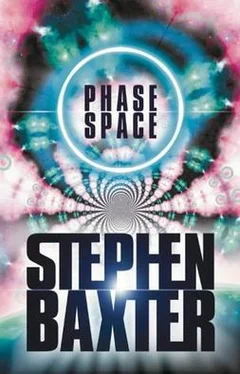
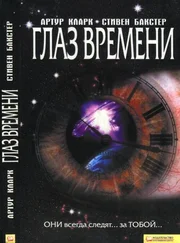

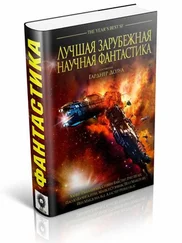
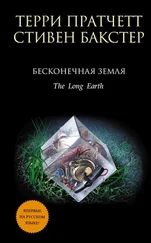
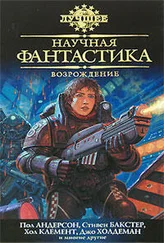


![Стивен Бакстер - Бесконечный Космос [litres]](/books/415680/stiven-bakster-beskonechnyj-kosmos-litres-thumb.webp)
